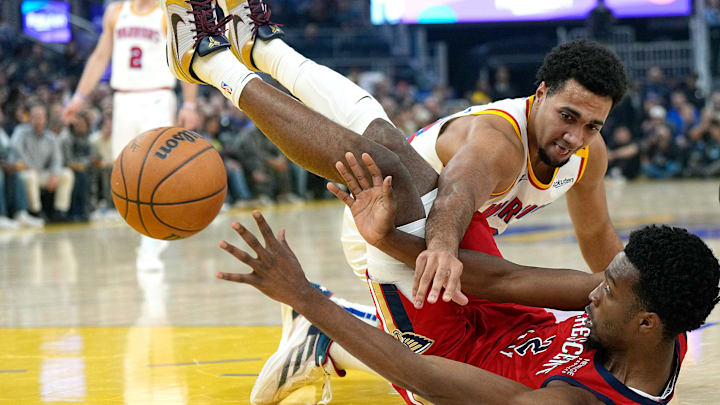The New Orleans Pelicans have begun their season on precarious ground. They now stand at 2-3 with multiple losses to rebuilding, lesser teams, absolutely tanking any optimism and title hopes that they brought into the year.
It's not just their record; it's how they've gotten here. It took a furious fourth-quarter comeback for them to eke out a two-point win over a rebuilding Portland Trail Blazers squad. They went out and got demolished by that same team two days later, 103-125. They followed up that performance by blowing a 20-point lead to lose by 18 to a Golden State Warriors team missing Stephen Curry. The very next day, they took another bludgeoning from the Dubs, 89-104.
Of course, there's still plenty of time for the Pelicans to right the ship, and they have been dealing with loads of injuries — although one would think that they'd be more equipped to play shorthanded by now. There's still a chance that New Orleans will look like a completely different team with their point guard, Dejounte Murray, and Trey Murphy III back, but it wouldn't be surprising to see them become a middling squad at full-strength either, something they've exclusively been in the Zion Williamson era. Perhaps it's time for the New Orleans Pelicans to take a step backward to take two steps forward.
The Pelicans may need to reset to get over the hump
The New Orleans Pelicans may be another victim of trying to do too much too fast. The logic behind accelerating their timeline around Zion — a prodigious but injury-prone superstar — made perfect sense, but, with each passing day, it appears more and more evident that they may have gone about it in the wrong way.
It began with the Brandon Ingram trade. Grabbing a versatile scoring wing to take offensive pressure off of Zion was a reasonable idea, but Ingram's regression as both a 3-point shooter and defender made him an ill fit.
New Orleans then compounded that mistake by trading for CJ McCollum, another ball-needy scorer. CJ did adapt his game to better complement Zion and the rest of the roster, shifting his offense more off-ball and beyond the 3-point line. Unfortunately, he's still not a natural floor general or a good defender, so he's not an ideal piece either.
The Pelicans finally added a real point guard this past summer in Dejounte Murray, who's theoretically a transformative perimeter defender as well, but he still has quite a few overlapping skills with New Orleans's original "Big 3."
After this horrid start to the season for the Pelicans, Vice President David Griffin has to be looking for answers. He still has a few chips he can play, with a tradable All-Star talent in Brandon Ingram and a healthy stash of draft picks, but there are a lot of holes for him to try to patch midseason.
Outside of Brandon Ingram, the Pelicans only roster players untouchables, players they can't upgrade from, and near-minimum contracts which will make it immensely difficult for them to make any other deals. That leaves Griffin and New Orleans's brass with three options: go all in, ride it out, or use this season as a retooling period to better their future prospects.
The Pelicans could have two first-round picks this summer for what's slated to be a loaded draft class, featuring promising young stars like Cooper Flagg and Ace Bailey. They'll own the Milwaukee Bucks' first-rounder unless it winds up a top-four pick. They could also tank this year and maximize their chances of adding another franchise cornerstone next to Zion with their own selection.
This doesn't have to be a complete teardown either. Between Zion, Murray, Herb Jones, and Trey Murphy III, the Pelicans have a core group of young players who could very well form the foundations of a title contender as early as next year. Adding two strong rookies to that four would do wonders for the Pelicans' short and long-term future.
Abandoning their title pursuit this season will allow New Orleans to trade Ingram and CJ McCollum to the highest bidders. Rather than try to find a way to turn Ingram into a package that will shore up their center depth, playmaking issues, and perimeter defense, they can ship him off to whatever team is willing to give them the most draft capital.
If the Pelicans remain on their current course, it will be impossible for them to trade CJ, as there's no chance they can find a deal for him that will increase their immediate odds at a championship. Instead, if they accept their fate this year, they can move him to a team willing to pay in draft picks and salary relief instead. Swapping Ingram and McCollum's contracts for either straight cap space or smaller conglomerates of salaries will significantly boost the Pelicans' flexibility to make improvements down the road.
The New Orleans Pelicans can either sacrifice this season to potentially build a dynasty or lock themselves into a middling roster for the next half-decade.
